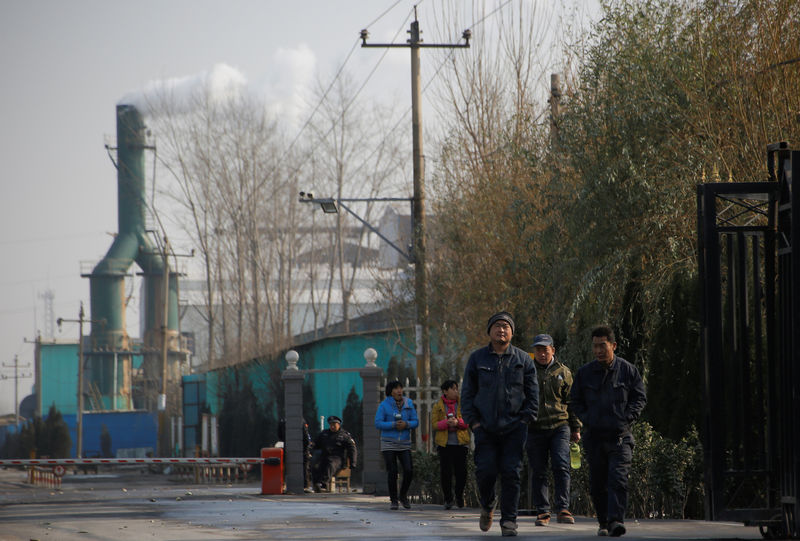BEIJING (Reuters) - Growth in China's sprawling manufacturing sector likely slowed only slightly in December despite tough pollution measures that have forced some factories to curb production and a cooling housing market, a Reuters poll showed.
The official manufacturing Purchasing Managers' Index (PMI) on Sunday is expected to dip marginally to 51.6 for December from an unexpectedly solid 51.8 in November, according to a median forecast of 30 economists polled by Reuters.
While the reading is seen softening, it would still suggest the 18th straight month of expansion for China's manufacturers, which are posting their strongest profits in years thanks to a building boom and resurgent export demand. The 50-mark divides expansion from contraction on a monthly basis.
However, a slowdown has started to take hold in the sector in the last few months due to a wide-ranging combination of government measures, from the crackdown on smog in heavily industrialized northern provinces to continued curbs on the housing market which are weighing on property investment.
Chinese steelmakers in 28 cities have been ordered to curb output between mid-November and mid-March, while a campaign to promote cleaner energy by converting coal to natural gas has also hampered manufacturing activity in some cities, leading to shortages and sending prices spiking.
Still, there are signs that steel mills, smelters and plants in parts of the country with fewer restrictions have ramped up production to win more market share, largely offsetting the "rustbelt" declines on a nation-wide basis.
While the war on smog is creating a lot of noise around China's true industrial activity, underlying demand is clearly starting to show some signs of fatigue as massive government infrastructure spending begins to taper off and cities look set to keep tough housing curbs in place to keep a lid on soaring prices.
Higher borrowing costs are also expected to drag more forcefully on factory activity in 2018 as Beijing continues to focus on reducing high corporate debt levels and defusing risks in the financial system.
The central bank nudged up interbank rates earlier this month for the fourth time this year, though policymakers are keen not to tap the brakes too sharply and risk a sharper economic slowdown.
Sources have told Reuters that Chinese leaders are likely to stick with a growth target of around 6.5 percent for 2018, even as they ratchet up efforts to prevent a destabilizing build-up of debt.
A similar growth target was set for 2017, but Beijing is expected to easily meet or beat that given strong 6.9 percent expansion in the first nine months of the year.
Economists expect the findings of a private survey on China's factory activity on Tuesday will also show activity in December expanded at slightly slower but still solid pace.
They predict the private Caixin/Markit Manufacturing Purchasing Managers' index (PMI) will be 50.6 in December versus 50.8 the previous month.
The private survey tends to focus on small and mid-sized firms, which have not benefited as much from the year-long state-led construction boom as large, government-owned "smokestack" industries.
The official PMI survey will be published on Dec. 31, along with a similar official survey covering the services sector.
The private Caixin PMI will be published on Jan. 2, with the Caixin services PMI to be released on Jan. 4.

(This version of the story has been refiled to fix word in paragraph three)